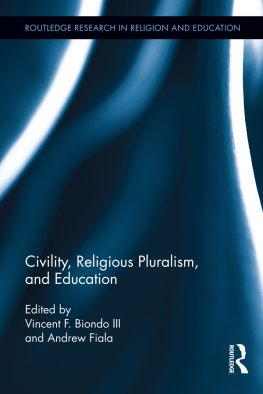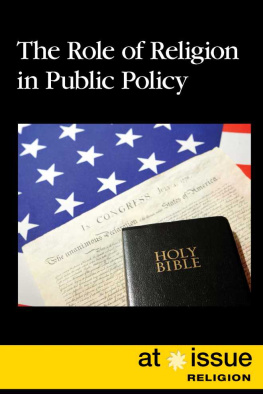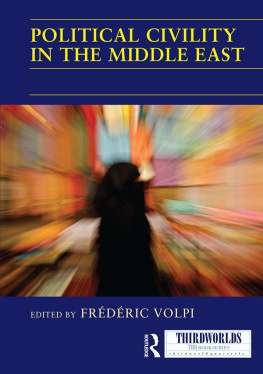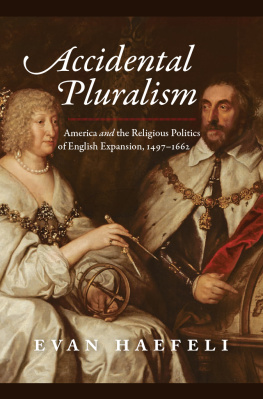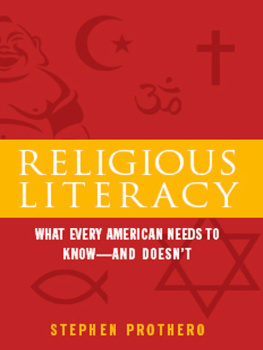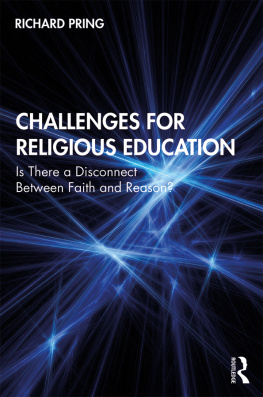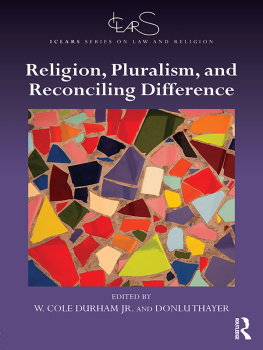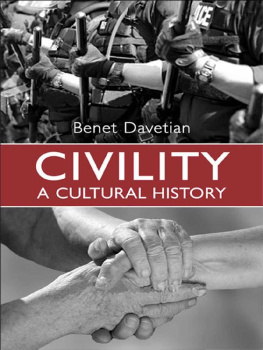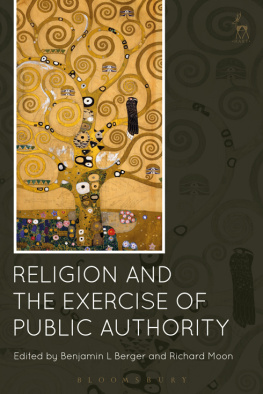Civility, Religious Pluralism, and Education
This book focuses on the problem of religious diversity, civil dialogue, and religion education in public schools, exploring the ways in which atheists, secularists, fundamentalists, and mainstream religionists come together in the public sphere, examining how civil discourse about religion fits within the ideals of the American political and pedagogical systems and how religious studies education can help to foster civility and toleration.
Vincent F. Biondo III is Associate Professor of Western Religious Traditions and Middle East Studies at Fresno State University. He is co-editor (with Richard D. Hecht) of Religion and Culture: Contemporary Practices and Perspectives. He has conducted research on Islam in the U.S. and Britain.
Andrew Fiala is Professor of Philosophy, Chair of the Philosophy Department, and Director of the Ethics Center at Fresno State University. His books include: Tolerance and the Ethical Life (2005), What Would Jesus Really Do? (2007), The Just War Myth (2008) and Public War, Private Conscience (2010). Fiala is co-editor of the journal Philosophy in the Contemporary World.
Routledge Research in Religion and Education
S ERIES E DITOR : M ICHAEL D. W AGGONER , University of Northern Iowa, USA
| Religion in Education |
Innovation in International Research |
Edited by Joyce Miller, Kevin
OGrady and Ursula McKenna |
| Civility, Religious Pluralism, and Education |
Edited by Vincent F. Biondo III and Andrew Fiala |
Civility, Religious Pluralism, and Education
Edited by
Vincent F. Biondo III and
Andrew Fiala

First published 2014
by Routledge
711 Third Avenue, New York, NY 10017
and by Routledge
2 Park Square, Milton Park, Abingdon, Oxon OX14 4RN
Routledge is an imprint of the Taylor & Francis Group, an informa business
2014 Taylor & Francis
The right of Vincent F. Biondo III and Andrew Fiala to be identified as the authors of the editorial material, and of the authors for their individual chapters, has been asserted in accordance with sections 77 and 78 of the Copyright, Designs and Patents Act 1988.
All rights reserved. No part of this book may be reprinted or reproduced or utilised in any form or by any electronic, mechanical, or other means, now known or hereafter invented, including photocopying and recording, or in any information storage or retrieval system, without permission in writing from the publishers.
Trademark Notice: Product or corporate names may be trademarks or registered trademarks, and are used only for identification and explanation without intent to infringe.
Library of Congress Cataloging-in-Publication Data
Civility, religious pluralism, and education / edited by Vincent F. Biondo III, and Andrew Fiala
pages cm. (Routledge research in religion and education) Includes bibliographical references and index.
1. CourtesyUnited States. 2. Religious pluralismUnited States. 3. EducationUnited States. 4. Religion in the public schoolsUnited States. I. Biondo, Vincent F. II. Fiala, Andrew G. (Andrew Gordon), 1966
BJ1533.C9C55 2013
201.5dc23
2013019149
ISBN13: 978-0-415-81399-0 (hbk)
ISBN13: 978-0-203-06769-7 (ebk)
Contents
NICHOLAS PIEDISCALZI |
VINCENT F. BIONDO III AND ANDREW FIALA |
CHARLES C. HAYNES |
JEDD MEDEFIND |
ANDREW FIALA |
JEFFREY DUECK |
TIM MOSTELLER |
MARTHA L. SMITH ROBERTS |
DIANE L. MOORE |
BRUCE GRELLE |
JONATHAN R. HERMAN |
COLLEEN WINDHAM-HUGHES |
HENRY GOLDSCHMIDT (WITH MATTHEW WEINER) |
AMIR HUSSAIN |
CHARLES C. HAYNES |
VINCENT F. BIONDO III |
The opening decade of the twenty first century brought increased attention to religion as an important dimension of culture and politics. Early in this period, the dramatic multi-pronged attacks of September 11, 2001 ushered in an awareness of potential large-scale terrorist threats undertaken by a small group with religious motivations. Over the same period we came to see an increase in conservative religious groups activities in politics. In the US we see this as an evolution from televangelist Jerry Falwells Moral Majority that emerged as a force in the late 1970s and as the beginning of the New Religious Right. On further reflection, however, we see the involvement of religion extending much further back as a fundamental part of our social organisation rather than a new or emerging phenomenon. We need only note the religious wars of early modern Europe or the contentious development of the US church and state doctrine as evidences of religions longstanding role as a source of competing values and beliefs. That said, there has indeed been a significant upturn in research and scholarship across many disciplines relative to the study of religion in the last decade and more. This is particularly the case in the area of the relationship of education and religion.
Religious education, or study toward formation in a particular faith tradition, has been with us for millennia, study about religion as an academic subject apart from theology is more recent. Whereas theology departments proceeded from religious assumptions aiming to promulgate a faith tradition, the religious studies field emerged as a discipline that sought to bring a more disinterested social scientific approach to the study of religion. The origins of this approach date back to the European research centers that influenced US scholars beginning in the eighteenth century. The formalisation of this trend, however, is a fairly recent phenomenon as illustrated by the 1949 formation of Society for the Scientific Study of Religion with its own scholarly journal and the creation of religious studies departments across the US in the wake of the US Supreme Court decision in 1963 that allowed teaching about religion (rather than for) in public education institutions. It was also that same year that the American Academy of Religion was born out of a group of scholars that had since 1909 been meeting under the various names related to Biblical Study.
It is out of this relatively recent increase in scholarly attention to religion and education that this new book series appears. Routledge Publishers have long been an important presence in the respective fields of religion and of education. It seemed like a natural step to introduce a book series focused particularly on Research in Religion and Education. My appreciation extends to Max Novick for guiding this series into being and now to Stacy Noto for continuing Routledges oversight.
It further seems entirely appropriate that the first volume in this series be about the work and influence of one scholar in particular who has exercised distinguished leadership in this field of religion and education for many years, Professor Robert Jackson, from 1994 to 2012, the Director of the University of Warwicks Religions and Education Research Unit. Professor Jacksons work in higher education spans forty years and has impacted the scholarship of religion and education around the world. His early ethnographic research on Hindu communities in the United Kingdom developed into what he called an interpretive approach to the study of religion education producing important work that led to the recognition by the distinguished Templeton UK Award in 1996. His two books,
Next page
